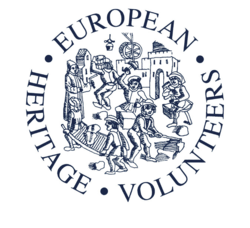The Project Partners Meeting is the core event of the European Heritage Volunteers Network gathering representatives of the different institutions, organisations, and initiatives involved in various European countries in the European Heritage Volunteers Programme. The annual Project Partners Meetings allow the participants to evaluate the actual season and to plan European Heritage Training Courses and European Heritage Volunteers Projects for the upcoming seasons, to develop and maintain common quality standards, and to exchange experiences and best practice models.
In the past, the Project Partners Meeting had been taken place after the season. From 2025 onwards, it is moved towards May to enable better and more detailed planning for the upcoming season.
The European Heritage Volunteers Project Partners Meeting 2026 is foreseen to take place in May 2026.
The European Heritage Volunteers Project Partners Meeting 2025 took place in May 2025 at Lauenstein Castle near Dresden / Germany.
The European Heritage Volunteers Project Partners Meeting 2023 took place in October 2023 at the Lithuanian Opan-Air Museum in Rumsiskes / Lithuania.
The European Heritage Volunteers Project Partners Meeting 2022 took place in October 2022 near Vienna / Austria.
The European Heritage Volunteers Project Partners Meeting 2021 took place in October 2021 in Görlitz / Germany.
On October, 29th, 2021 the annual conference "Best practices of heritage volunteering and practical oriented heritage education" took place in the New Synagogue Görlitz which had been after several years of restoration recently re-opened as culture centre.
Due to the situation caused by the COVID-19 pandemic, the originally planned European Heritage Volunteers Project Partners Meeting 2020 could not take place.
The European Heritage Volunteers Project Partners Meeting 2019 took place in November 2019, in Tyniec and Kraków / Poland. The first three days took place in Tyniec and have been dedicated to the evaluation of the 2019 projects and the planning of the 2020 projects.
On November, 28th, 2019 the annual conference "Volunteering for European Cultural Heritage" which has been jointly organised by the European Heritage Volunteers and the Polish National Heritage Institute took place in Kraków.
The European Heritage Volunteers Project Partners Meeting 2018 took place in November 2018 in Weimar and Leipzig.
The first three days took place in Weimar and the programme was be comparable to the programme of the Project Partners Meetings in the previous years.
On the following day, European Heritage Volunteers organised within the framework of the "denkmal", Europe's Leading Trade Fair for Conservation, Restoration and Old Buildings Renovation, a conference under the title "Volunteering for European Cultural Heritage". The participants of the Coordinators' Meeting were invited to take part at the conference and to contribute to the conference's programme.
Participants of the Project Partners Meeting were welcome to spend an additional day at the "denkmal" as well as at the MUTEC, the International Trade Fair for Museum and Exhibition Technology, that took place parallely.
The European Heritage Volunteers Project Partners Meeting 2017 took place in November 2017 in Weimar, Germany and gathered representatives of heritage linked organisations and institutions from Belarus, Croatia, Finland, France, Germany, Italy, Poland, Portugal and Russia.
The focus of the meeting lied on the evaluation of the 2017 project cycle, the detailed preparation of the 2018 cycle with a special focus on the activities in the frame of the European Year of Cultural Heritage as well as on the preparation of the 2019 project cycle. In addition to that a whole day had been dedicated to the presentation of the particular projects resp. project ideas in order to enable exchange of experiences and of best practice models.
Furthermore, an excursion to the World Heritage Site "Classical Weimar" focusing both in tangible and intangible heritage aspects had been organised. The highlight of the excursion was a guided visit of the historical Anna Amalia Library that had burned down in 2004. The visit provided a detailed inside view into the challenges to rescue, conserve and restore - tangible as well as intangible - heritage affected by catastrophes.
The European Heritage Volunteers Project Partners Meeting 2016 took place for logistic reasons in February 2017 and combined the evaluation of the 2016 project cycle as well as the preparation for the 2017 cycle.
The meeting gathered representatives from heritage linked organisations and institutions form Armenia, Belarus, Croatia, Germany, Kosovo, Poland and Spain.
The focus of the meeting lied on the exchange of experiences and of best practice models and on the detailed preparation of European Heritage Volunteers Partner Projects for 2017 and 2018.
In addition to that, examples of heritage linked volunteering projects in Weimar had been visited and a guided tour through garden and park heritage in Weimar had been provided. Since the majority of the participants of the Networking Meeting had a professional background in archaeology a guided tour through the Archaeological Museum of the State of Thuringia, held by its director, Dr. Diethard Walter, and a substantial and detailed excursion to various ongoing excavations in Erfurt, the capital of Thuringia, managed by the responsible archaeologist from the Archaeological Institute of the State of Thuringia, Dr. Karin Sczech, had been organised.





